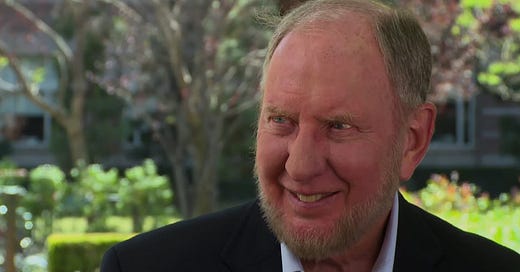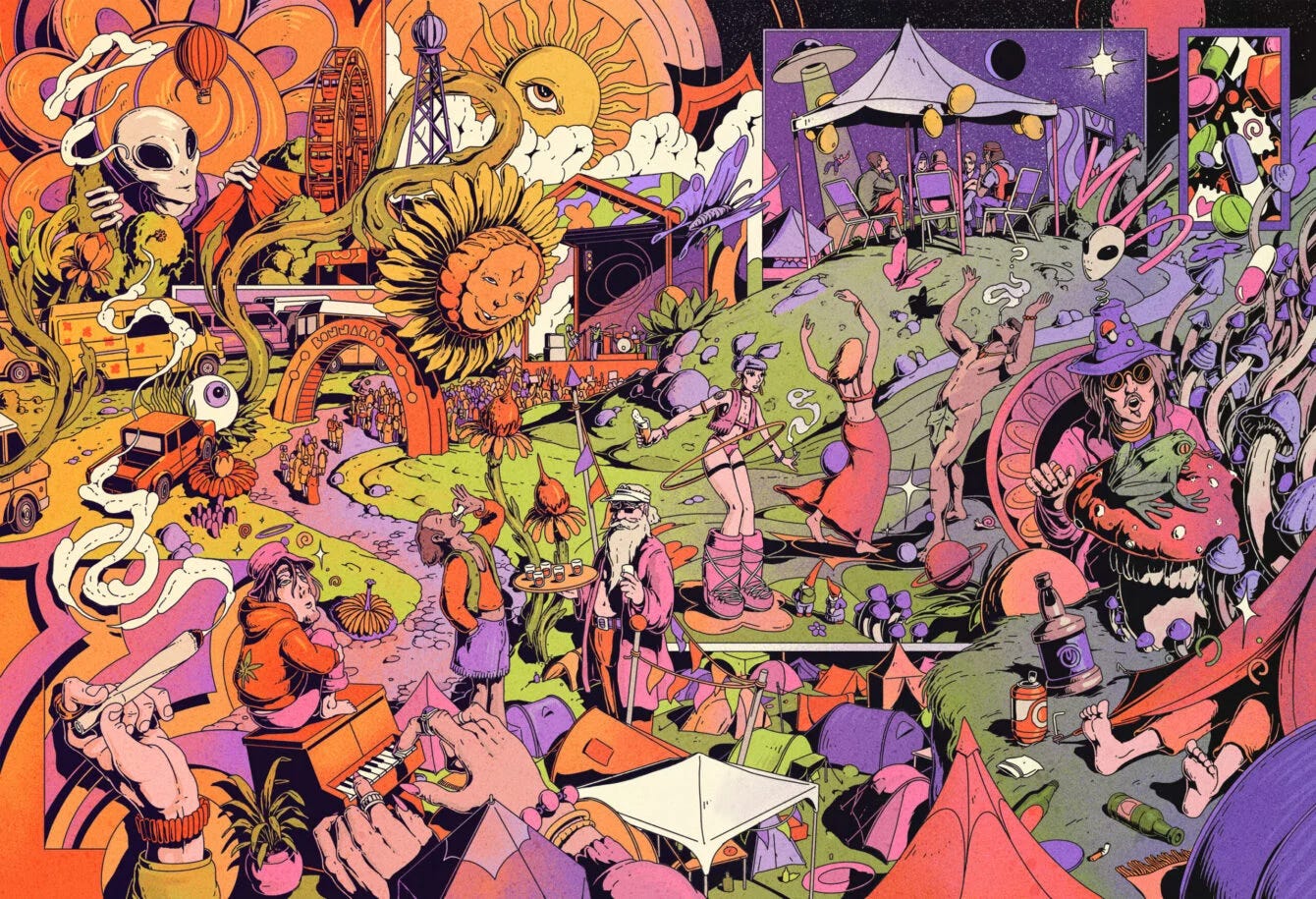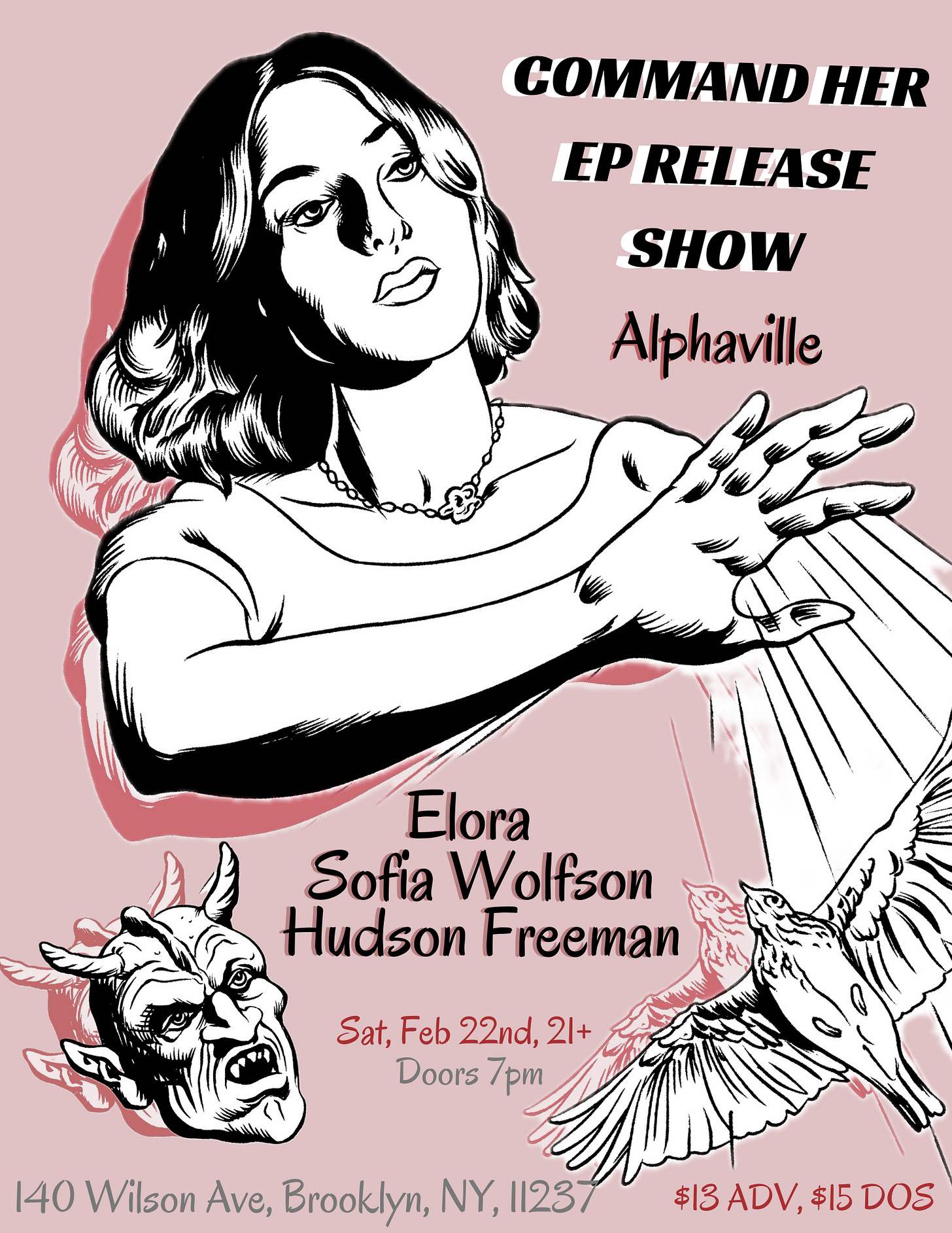It’s my birthday this Monday and you deigning to read this essay I wrote in my notes app is my present in advance — thanks!
n o t e
I WILL BE OPENING FOR ETHEREAL INDIE-ROCK LUMINARY ELORA ON FEBRUARY 22ND @ ALPHAVILLE
IF YOU LIVE IN THE NEW YORK METROPOLITAN AREA, I ENCOURAGE YOU TO JOIN US. DON’T WORRY - THE VENUE JUST SO HAPPENS TO BE IN THE COOLEST NEIGHBORHOOD IN THE WORLD… BUSHWICK
So there’s this really insane-looking political scientist guy named Robert Putnam who has occupied my waking mind for the last few years, not entirely due to his squirrelly appearance, but his argument for why everyone feels so damn lonely right now.
Did I, in point of fact, read the groundbreaking work - Bowling Alone1?
No, but I bought it! It sits in a v e r y important section of my private (and largely aspirational) library. I did pore over the wikipedia entry, watch 5 interviews with the curiously groomed fellow on Youtube.com, and basically ya know like…got the gist of it.
Published in 2000, Bob basically breaks the news that Americans are rapidly withdrawing from civic social life. Even though more people were bowling than ever (I had to remind myself this was before Wii bowling), bowling leagues were going the way of the dodo. You may not literally go bowling alone, without any friends or family, but bowling is no longer a community sport…and THAT is why you’re lonely.
It’s just an example.
Putnam was pointing out something fairly obvious in hindsight - MASSIVE disengagement from membership-based association. “America was transforming from a nation of joiners to a nation of loners”2 Whereas now, where the word C O M -M U N I T Y only seems to sweetly drip off the side of so-called “third space” coffee shops, reseller pop-ups, and soapy chueg-millennial advertising, it used to denote public social life oriented around shared commitments.
Bracketing out all these cumulative effects we are used to talking about ad nauseam - smart phones, social media, para-social podcast subscriptions, whatever! Two decades later, Bowling Alone’s thesis on loneliness actually feels almost too boring and obvious to say out loud. You wouldn’t even have to factor in the technological changes to take a guess at what the downstream effects on public life and social trust would be when people stopped belonging to anything.
Most people are not volunteering, they’re not attending a church or temple or mosque, they’re not in a club, they probably weren’t in a fraternity/sorority, they aren’t in a labor union or guild - most people are not a member of anything… But other than out of a bloodless sociologically-informed pragmatism, why should they be?
Key to Bowling Alone’s analysis is a unit Robert Putnam calls “social capital”, which refers to a person’s inclusion in and ability to benefit from social networks. And key to social networks are “the norms of reciprocity and trustworthiness (emphasis mine) that arise from them.”3
Why should Americans commit themselves to anything when damn near every institution, now seems widely discredited? Politically, an American’s civic democratic commitment now seems to turn on negative partisanship, where your participation is less membership to a party than it is a suspicion and distrust for the opposing one. 4 Institutional religion provokes the ire and skepticism of everyone, most of all, those who belong to the faiths!
And jettisoning these questions of legitimacy (whether we can trust institutions), why should Americans fill their few non-working hours with meetings for organizations they cannot reasonably expect to get anything out of?
Anyways.
Illustration by Micha Huigen
I was thinking about all this while I was reading Harper’s Magazine’s recent cover essay - High and Dry5, about the sober-roos.
“Since 2002, this assortment of music lovers has vowed to remain sober for the duration of the festival…these joyfully teetotaling people are the vanguard of a newly popular movement, an avant-garde of abstinent revelers who have eschewed the shroud of embarrassed anonymity and who insist it’s possible, even without intoxicants, to have the kind of cut-loose, notional fun that can be both ecstatic and life altering.”
Aside from being an addict himself, and curious how “former addicts and alcoholics could live their lives this way, rolling the dice with their sobriety in a Boschian festival environment”, the writer seems more interested in the transcendental appeal of these sweaty summer concerts.
“Overnight camps like Bonnaroo—and with it, places like Coachella, Burning Man, Electric Forest, etc.—turn out to promise more than just a safe, welcoming sanctuary for unbridled libertine carousing. Instead, what they offer is much more fundamental, a cleansing of perception, a wholesale spiritual rejuvenation. The obvious precursors here are the tent-meeting revivals of the Second Great Awakening, where scores of flagging believers tramped to God-haunted countrysides to take part in massive outdoor spectacles, ones meant not only to enlist newly ensorcelled congregants but also to perform CPR upon those scores of toilworn Christians who’d grown disenchanted after the Enlightenment...Over the preceding few years, it’s become glaringly apparent to me that our own moment suffers from a comparable disenchantment. It wasn’t that everyone around me was some psychological case study for the meaninglessness of existence, but in my day-to-day interactions with colleagues and friends, I noticed an unmistakable uptick in nihilism and depression.”
Now I am not a teetotaler, nor have I ever been to Bonnaroo or any music festival. But I did grow up in the Evangelical church and I am now (conceivably) a professional musician. I understand how music creates alternative forms of community and spiritual fulfillment for people. It has done so for me as well, many times throughout my life.
But I need people to understand how truly lonely music has become for most musicians and audiences. It is ever increasingly, a private and exclusive (yes, I’m sorry gatekept), luxury commodity. I do not know anyone who can afford to go to Bonnaroo. I do not know anyone who can afford to consistently go to local concerts.
When you move to New York City or Nashville or Los Angeles or Austin to find a music scene, you will find almost no one but atomized 1099-bots grinding and #hustling to eek out a living through shitty bar gigs, DIY-emulating gentrified house shows, and six band nightmare bills.
Sure, maybe music and art can fulfill the hole left over from enchanted, mystical, and religious experiences, but it is ABSOLUTELY NOT a social network formed by “reciprocity” and “social trust”.
It is commerce, not community. Every musician I know would love for it to be so, but it cannot be - music cannot be communitarian as long as it is organized by private market relations. We can be the best musician we can be and try to cultivate scenes that subvert these transactional relationships of music production. The biggest corporations in the world can give us week long carnivalesque celebrations of indie rock that prefigure the utopian horizon of political possibility through sites of “collective effervescence”. It’s not church. I’m sorry, it’s not.
I am going bowling this week for my birthday. Thankfully, I am not going alone. I’m going with the friends I have who don’t have work that particular evening.
Sorry, I didn’t mean for this to be such a bummer. We have GOT to figure something out for like society and shit….
A G A I N
I WILL BE PLAYING SOME SOLO FOLK ROCK FOR THE ELORA EP RELEASE SHOW ON FEBRUARY 22ND @ ALPHAVILLE w/ SOFIA WOLFSON. COME THROUGH! TICKET LINK HERE
Robert Putnam, Bowling Alone: The Collapse and Revival of American Community (Simon & Schuster, New York, NY, 2000)
https://www.nytimes.com/2024/07/13/magazine/robert-putnam-interview.html
Robert Putnam, Bowling Alone: The Collapse and Revival of American Community (Simon & Schuster, New York, NY, 2000), 19.
Benjamin Studebaker, The Chronic Crisis of American Democracy: The Way is Shut (Palgrave Macmillan, 2023)
https://harpers.org/archive/2025/02/high-and-dry-sobriety-transcendence-bonnaroo-barrett-swanson/






